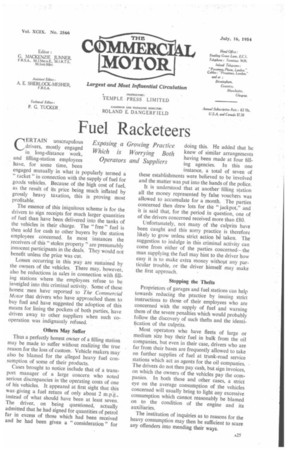Fuel Racketeers
Page 27

If you've noticed an error in this article please click here to report it so we can fix it.
CERTAIN unscrupulous drivers, mostly engaged in Jong-distance work, and filling-station employees have, for some time, been engaged mutually in what is popularly termed a " racket " in connection with the supply of fuel for goods vehicles. Because of the high cost of fuel, as the result of its price being much inflated by grossly heavy taxation, this is proving most profitable.
The essence of this iniquitous scheme is for the drivers to sign receipts for much larger quantities of fuel than have been delivered into the tanks of the vehicles in their charge. The " free " fuel is then sold for cash to other buyers by the station employees concerned. In most instances the receivers of this stolen property " are presumably innocent participants in the deals. They would not benefit unless the price was cut.
Losses occurring in this way are sustained by the owners of the vehicles. There may, however, also be reductions in sales in connection with filling stations where the employees refuse to be inveigled into this criminal activity. Some of these honest men have reported to The Commercial Motor that drivers who have approached them to buy fuel and have suggested the adoption of this means for lining the pockets of both parties, have driven away, to other suppliers when such cooperation was indignantly refused.
Others May Suffer Thus a perfectly honest owner of a filling station may be made to suffer without realizing the true reason for the loss of custom. Vehicle makers may also be blamed for the alleged heavy fuel consumption of some of their products.
Cases brought to notice include that of a transport manager of a large concern who noted serious discrepancies in the operating costs of one of his vehicles. It appeared at first sight that this was giving a fuel return of only about 2 m.p:g., instead of what should have been at least seven. The driver, on being questioned, actually admitted that he had signed for quantities of petrol far in excess of those which had been received and he had been given a " consideration " for doing this. He added that he knew of similar arrangements having been made at four filling agencies. In this one instance, a total of seven of these establishments were believed to be involved and the matter was put into the hands of the police.
It is understood that at another filling station all the money represented by false vouchers was allowed to accumulate for a month. The parties concerned then drew lots for the "jackpot," and it is said that, for the period in question, one of of the drivers concerned received more than £80.
Unfortunately, not many of the culprits have been caught and this sorry practice is therefore likely to grow unless strict action be' taken. The suggestion to indulge in this criminal activity can come from either of the parties concerned—the man supplying the fuel may hint to the driver how easy it is to make extra money without any particular trouble, or the driver himself may make the first approach.
Stopping the Thefts Proprietors of garages and fuel stations can help towards reducing the practice by issuing strict instructions to those of their employees who are concerned with the supply of fuel and warning them of the severe penalties which would probably follow the discovery of such thefts and the identification of the culprits.
Most operators who have fleets of large or medium size buy their fuel in bulk from the oil companies, but even in their case, drivers who are far from their bases are frequently allowed to take on further supplies of fuel at trunk-road service stations which act as agents for the oil companies. The drivers do not then pay cash, but sign invoices, on which the owners of the vehicles pay the companies. In both these and other cases, a strict eye on the average consumption of the vehicles concerned will usually bring to light any excessive consumption which cannot reasonably be blamed on to the condition of the engine and its auxiliaries.
The institution of inquiries as to reasons for the heavy consumption may then be sufficient to scare any offenders into mending their ways.




























































































